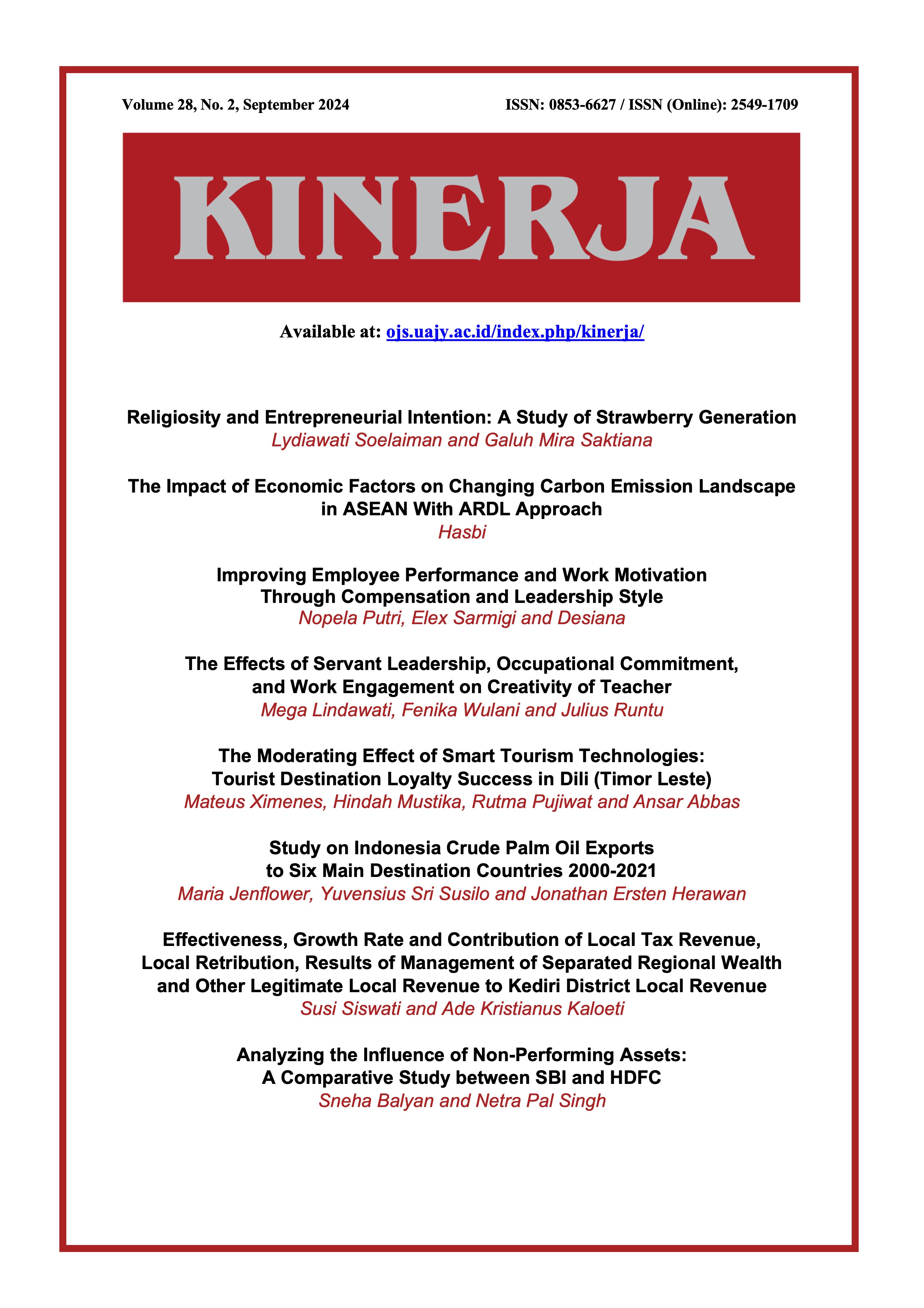The Moderating Effect of Smart Tourism Technologies: Tourist Destination Loyalty Success in Dili (Timor Leste)
DOI:
https://doi.org/10.24002/kinerja.v28i2.9454Keywords:
smart technologies, satisfaction, place historicalAbstract
The research focuses on testing and analyzing the influence of several components of tourist destination loyalty, namely tourist satisfaction, experience quality, and smart tourist technologies which as a moderator variable. The research uses a quantitative method to see the influence of each variable. The respondents of the research are from various backgrounds, with a total of 317 visitors (210 women) and (107 men) who have visited tourist attractions of places historical locations in Dili (Timor Leste). The processing data use SEM-PLS, and the results of processing data show that all hypotheses significantly influence (direct) and (indirect hypotheses: smart tourist satisfaction is able to be a good moderator variable between experience quality and tourist satisfaction). The theory implication as a development of behavior and smart technologies theory, as well as the practical implication of being a strategic policy maker for stakeholders. The novelty of the research is that experience quality is in the form of physical and non-physical experiences that have positive emotions that are felt and shared with everyone so that there is satisfaction for visitors and tourist attractions.
References
Alshihre, F., Chinyio, E., Nzekwe-Excel, C., and Daniel, E.I., 2020. Improving clients' satisfaction in construction projects: the case of Saudi Arabia. Built Environment Project and Asset Management, 10(5), 709–723.
Brida, J.G., Meleddu, M. and Pulina, M., 2016. Understanding museum visitors' experience: a comparative study. Journal of Cultural Heritage Management and Sustainable Development, 6(1), pp.47-71.
Cevdet, M. and Erkut, B., 2015. Journal of Destination Marketing & Management Cultural tourism in Istanbul: The mediation effect of tourist experience and satisfaction on the relationship between involvement and recommendation intention. Journal of Destination Marketing & Management, pp.1–9.
Chan, J.K.L., 2009. The consumption of museum service experiences: Benefits and value of museum experiences. Journal of Hospitality and Leisure Marketing, 18 (2–3), pp.173–196.
Chen, C.F. and Tsai, D.C., 2007. How destination image and evaluative factors affect behavioral intentions? Tourism Management, 28 (4), pp.1115–1122.
Chou, S.W., 2020. Understanding relational virtual community members' satisfaction from a social learning perspective. Journal of Knowledge Management, 24 (6), pp.1425–1443.
Cropanzano, R., Anthony, E.L., Daniels, S.R. and Hall, A.V., 2017. Social exchange theory: A critical review with theoretical remedies. Academy of Management Annals, 11(1), pp.479-516.
Del Chiappa, G., Andreu, L., & Gallarza, M. G., 2014. Emotions and visitors' satisfaction at a museum. International Journal of Culture, Tourism, and Hospitality Research, 8(4), pp.420–431.
Dirsehan, T. and Yalçin, A.M., 2011. Comparison between holistic museum visitors and utilitarian museum visitors. International Journal of Marketing Studies, 3(4), p.78.
Dolnicar, S. and Matus, K., 2008. Are green tourists a managerially useful target segment?. Journal of Hospitality & Leisure Marketing, 17(3-4), pp.314-334.
Domínguez-Quintero, A.M., González-Rodríguez, M.R. and Roldán, J.L., 2021. The role of authenticity, experience quality, emotions, and satisfaction in a cultural heritage destination. In Authenticity and Authentication of Heritage (pp. 103-117). Routledge.
Femenia-Serra, F., Neuhofer, B. and Ivars-Baidal, J.A., 2019. Towards a conceptualisation of smart tourists and their role within the smart destination scenario. The Service Industries Journal, 39(2), pp.109-133.
Fu, X., Zhang, W., Lehto, X.Y., and Miao, L., 2018. Celebration of heritage: linkages between historical re-enactment festival attributes and attendees' value perception. Journal of Travel and Tourism Marketing, 35 (2), pp.202–217.
Garcia, J.M., Freire, O.B.D.L., Santos, E.B.A., and Andrade, J., 2020. Factors affecting satisfaction and loyalty to online group buying. Revista de Gestão, 27 (3), pp211–228.
Gwiaździński, E., Kaczorowska-Spychalska, D. and Pinto, L.M., 2020. Is it a smart city a creative place?. Creativity Studies, 13(2), pp.460-476.
Grundey, D., 2008. Applying sustainability principles in the economy. Technological and Economic Development of Economy, 14(2), pp.101-106.
Han, H. and Hyun, S.S., 2015. Customer retention in the medical tourism industry: Impact of quality, satisfaction, trust, and price reasonableness. Tourism Management, 46, pp.20–29.
Han, H., Lee, S. and Hyun, S.S., 2019. Role of internal and external museum environment in increasing visitors' cognitive/affective/healthy experiences and loyalty. International Journal of Environmental Research and Public Health, 16(22), p.4537.
Hair, J.F., Ringle, C.M., Gudergan, S.P., Fischer, A., Nitzl, C. and Menictas, C., 2019. Partial least squares structural equation modeling-based discrete choice modeling: an illustration in modeling retailer choice. Business Research, 12(1), pp.115-142.
Huang, H., Min, S.D., Wang, T.S.R., and Mao, L.L., 2016. Social exchange process in collectivistic countries: an examination of sporting events in China. European Sport Management Quarterly, 16 (2), pp.172–189.
Hussein, A.S., Hapsari, R.D.V., and Yulianti, I., 2018. Experience quality and hotel boutique customer loyalty: Mediating role of hotel image and perceived value. Journal of Quality Assurance in Hospitality and Tourism, 19 (4), pp.442–459.
Jimber Del Rio, J.A., Hernández-Rojas, R.D., Vergara-Romero, A. and Dancausa Millán, M.G.D., 2020. Loyalty in heritage tourism: The case of Córdoba and its four world heritage sites. International Journal of Environmental Research and Public Health, 17(23), p.8950.
Klaus, P., Gorgoglione, M., Buonamassa, D., Panniello, U., and Nguyen, B., 2013. Are you providing the "right" customer experience? The case of Banca Popolare di Bari. International Journal of Bank Marketing, 31 (7), pp.506–528.
Kumar, S. and Valeri, M., 2022. Understanding the relationship among factors influencing rural tourism: a hierarchical approach. Journal of Organizational Change Management, 35(2), pp.385-407.
Leavy, P. 2017. Research Design: Quantitative, Qualitative, Mixed Methods, ArtsBased, and Community-Based Participatory Research Approaches. New York: The Guilford Press.
Lee, S., Phau, I., Hughes, M., Li, Y.F. and Quintal, V., 2016. Heritage tourism in Singapore Chinatown: A perceived value approach to authenticity and satisfaction. Journal of Travel & Tourism Marketing, 33(7), pp.981-998.
Lemon, K.N. and Verhoef, P.C., 2016. Understanding customer experience throughout the customer journey. Journal of Marketing, 80 (6), pp.69–96.
Li, G., Bie, Z., Xie, H., and Lin, Y., 2016. Customer satisfaction based reliability evaluation of active distribution networks. Applied Energy, 162, pp.1571–1578.
Ma, S.C., Ma, S.M., Wu, J.H., and Rotherham, I.D., 2013. Host residents' perception changes on major sport events. European Sport Management Quarterly, 13 (5), 511–536.
Meeprom, S. and Silanoi, T., 2020. Investigating the perceived quality of a special event and its influence on perceived value and behavioural intentions in a special event in Thailand. International Journal of Event and Festival Management, 11 (3), 337–355.
Muñoz, A.D.A. and Sánchez, S.G., 2015. Destinos turísticos inteligentes. Economía industrial, 395, pp.61-69.
Nguyen, H.T., Nguyen, H., Nguyen, N.D. and Phan, A.C., 2018. Determinants of customer satisfaction and loyalty in Vietnamese life-insurance setting. Sustainability, 10(4), p.1151.
Ngwira, C. and Bello, F.G., 2018. Museums as a vehicle for domestic tourism growth in Malawi: An analysis of the push and pull factors. African Journal of Hospitality, Tourism and Leisure, 7(1), pp.1–15.
Piancatelli, C., Massi, M., and Vocino, A., 2021. The role of atmosphere in Italian museums: effects on brand perceptions and visitor behavioral intentions. Journal of Strategic Marketing, 29 (6), pp.546–566.
Pine, J. and Gilmore, J.H., 1998. Economy leadership when there is no one to ask: Welcome to the experience economy. Harvard Business Review, 76(4), pp.97–105.
Prayag, G., Hosany, S., Nunkoo, R. and Alders, T., 2013. London residents' support for the 2012 Olympic Games: The mediating effect of overall attitude. Tourism Management, 36, pp.629-640.
Preko, A., Gyepi-Garbrah, T.F., Arkorful, H., Akolaa, A.A. and Quansah, F., 2020. Museum experience and satisfaction: Moderating role of visiting frequency. International Hospitality Review, 34(2), pp.203-220.
Sánchez, J., Callarisa, L., Rodriguez, R.M. and Moliner, M.A., 2006. Perceived value of the purchase of a tourism product. Tourism Management, 27(3), pp.394-409.
Sandell, R. and Janes, R.R., 2007. Museum Management and Marketing. New York: Routledge.
Sheng, C.W. and Chen, M.C., 2012. A study of experience expectations of museum visitors. Tourism Management, 33 (1), pp.53–60.
Shewach, O. R., & Sackett, P. R. 2016, April. Measurement of workplace aggression: Evaluation of intent to harm. Paper presented at the annual meeting of the Society for Industrial Organizational Psychology, Anaheim, CA.
Siano, A., Eagle, L., Confetto, M.G., and Siglioccolo, M., 2010. Destination competitiveness and museum marketing strategies: An emerging issue in the Italian context. Museum Management and Curatorship, 25(3), pp.259–276.
Trinh, T.T. and Ryan, C., 2016. Heritage and cultural tourism: the role of the aesthetic when visiting Mỹ Sơn and Cham Museum, Vietnam. Current Issues in Tourism, 19(6), pp.564–589.
Vanhaecht, K., De Ridder, D., Seys, D., Brouwers, J., Claessens, F., Van Wilder, A., Panella, M., Batalden, P. and Lachman, P., 2021. The history of quality: from an eye for an eye, through love, and towards a multidimensional concept for patients, kin, and professionals. European Urology Focus, 7(5), pp.937-939.
Veloso, C.M., Magalhães, D., Sousa, B.B., Walter, C.E., and Valeri, M., 2021. Encouraging consumer loyalty: the role of family business in hospitality. Journal of Family Business Management.
Verma, A. and Rajendran, G., 2017. The effect of historical nostalgia on tourists' destination loyalty intention: an empirical study of the world cultural heritage site–Mahabalipuram, India. Asia Pacific Journal of Tourism Research, 22(9), pp.977-990.
Vesci, M., Conti, E., Rossato, C. and Castellani, P., 2020. The mediating role of visitor satisfaction in the relationship between museum experience and word of mouth: evidence from Italy. The TQM Journal, 33(1), pp.141-162.
Wen, X., Sotiriadis, M. and Shen, S., 2023. Determining the key drivers for the acceptance and usage of AR and VR in cultural heritage monuments. Sustainability, 15(5), p.4146.
Xu, Z., Zhang, H., Zhang, C., Xu, M. and Dong, N., 2019. Exploring the role of emotion in the relationship between museum image and tourists' behavioral intention: The case of three museums in Xi'an. Sustainability, 11(3), p.559.
Zbuchea, A., 2014. Territorial Marketing Based on Cultural Heritage. Management and Marketing, 12(2), pp.136–151.
Zhang, J., Byon, K.K., Xu, K. and Huang, H., 2020. Event impacts associated with residents' satisfaction and behavioral intentions: a pre-post study of the Nanjing Youth Olympic Games. International Journal of Sports Marketing and Sponsorship, 21(3), pp.487-511.
Downloads
Published
Issue
Section
License
Copyright (c) 2024 Mateus Ximenes, Hindah Mustika, Rutma Pujiwat, Ansar Abbas

This work is licensed under a Creative Commons Attribution 4.0 International License.















